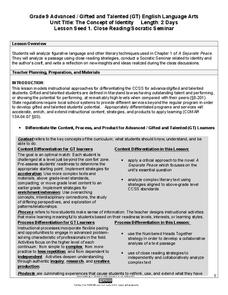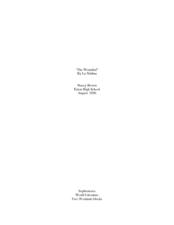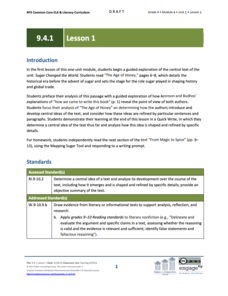Curated OER
Lesson: Storyboarding Revolution
Kids consider revolution as a basis for creativity, art, and storytelling. After reading an excerpt from the book, Persepolis, learners choose one event from any world revolution to write about. They storyboard the event focusing on...
Curated OER
Lesson: Nikhil Chopra: Performing Memory
Film imitates life; that's what they say. Using performance theory to tie the lesson together, learners attempt to understand memory and daily rituals as seen in art, film, and life. They read two chapters from the book, watch the...
Museum of Disability
Taking Visual Impairment to School
What is the world like when you can't see, or when your vision is impaired? Learn about how Lisa communicates with the world around her with Taking Visual Impairment to School by Rita Whitman Steingold. Learners answer discussion...
EngageNY
Talking with My Peers: Carousel of Reading Superheroes Around the World
In many places in the world, people go to great lengths to get books to read. This beginning-of-the-year activity uses pictures of people reading in extraordinary situations to stimulate effective listening and speaking using the...
iCivics
Lesson 1: Journalism
Extra! Extra! Do your pupils know what it takes to be a good journalist? Young news hounds explore the world of journalism through a series of activities that focus on ethical reporting. Learners read, evaluate, and investigate popular...
Curated OER
Lesson: Unmonumental: War, Politics, and Protest
Get those upper graders thinking about the world, social conflict, and art as a catalyst for change. They'll uncover the meanings behind four abstract works, intended to spread awareness of the need for social change. Kids are then asked...
Indiana University
World Literature: "One Evening in the Rainy Season" Shi Zhecun
Did you know that modern Chinese literature “grew from the psychoanalytical theory of Sigmund Freud”? Designed for a world literature class, seniors are introduced to “One Evening in the Rainy Season,” Shi Zhecun’s stream of...
Maryland Department of Education
The Concept of Identity Lesson 1: Close Reading/Socratic Seminar
John Knowles' A Separate Peace provides readers with an opportunity to develop their close reading and analytical skills as they look for what Knowles feels are the factors that shape our identity.
Curated OER
World Literature: “The Wounded” By Lu Xinhua
“The Wounded,” the title story from a collection of stories about the Chinese Cultural Revolution (1977-78), is the central text in a World Literature unit examining choices. An anticipation guide, discussion topics, vocabulary list,...
The New York Times
Evaluating Sources in a ‘Post-Truth’ World: Ideas for Teaching and Learning about Fake News
The framers of the United States Constitution felt a free press was so essential to a democracy that they granted the press the protection it needed to hold the powerful to account in the First Amendment. Today, digital natives need to...
Folger Shakespeare Library
Essential Everyday Bravery
Shakespeare's plays may be old, but they still have relevant lessons for today's world! A collection of lesson plans uses examples from The Merchant of Venice and District Merchants to teach about bravery. In addition to learning...
EngageNY
Grade 9 ELA Module 4, Unit 1, Lesson 4
Class members continue examining how writers develop and support their ideas by comparing two texts about globalization. Alongside chapters from Sugar Changed the World, young scholars read an article by the World Bank entitled...
EngageNY
Grade 9 ELA Module 4, Unit 1, Lesson 18
As first-year students continue to investigate how sugar changed the world, the focus shifts to a consideration of why people with limited job options take on dangerous or subjugating work. Class members read an opinion piece by Nicholas...
EngageNY
Grade 9 ELA Module 4, Unit 1, Lesson 6
How do writers create a specific tone in their text? As class members continue their study of Sugar Changed the World, they focus on the words and phrases that Aronson and Budhos use to create that tone in their descriptions of arduous...
EngageNY
Grade 9 ELA Module 4, Unit 1, Lesson 9
The supplemental text, "How Your Addiction to Fast Fashion Kills," allows learners to compare how other writers use evidence to support the argument that "rich countries benefit from harsh and abusive labor practices in poor countries."...
EngageNY
Grade 9 ELA Module 4, Unit 1, Lesson 8
In a close reading of "The Overseer" chapter from Sugar Changed the World, groups focus on the words Aronson and Budhos use to contrast the lifestyles of enslaved people and their enslavers. The whole class then engages in an...
EngageNY
Grade 9 ELA Module 4, Unit 1, Lesson 11
As part of a study of how writers structure their text so that readers understand events, class members do a close reading of "Is It Lawful to Make Slaves of Others Against Their Will?" a chapter in Aronson and Budhos' Sugar Changed the...
EngageNY
Grade 9 ELA Module 4, Unit 1, Lesson 1
How do writers introduce and develop the central ideas in a text? To answer this question, ninth graders closely examine "The Age of Honey," the opening chapter in Marc Aronson and Marina Budhos' Sugar Changed the World: A Story of...
Curated OER
A Study Guide for The Phantom of the Opera
Immerse yourself in the beautiful, twisted world of Andrew Lloyd Webber's The Phantom of the Opera. A detailed lesson plan provides important details about the writing, stagecraft, music, and literary elements of the famous musical, as...
Maryland Department of Education
The Concept of Diversity in World Literature Lesson 1: Unit Introduction
To launch a unit study of the concept of diversity in World Literature, class members compare Chinua Achebe's essay, "An Image of Africa: Racism in Conrad's Heart of Darkness" and Richard Rodriguez's essay, "The Chinese in All of Us: A...
Maryland Department of Education
The Concept of Diversity in World Literature Lesson 13: Unit Culmination - Symposium
To conclude a unit on the concept of diversity in world literature, class members conduct a symposium on "African Literature in Global Perspectives." In order to earn a spot on the panel, individuals craft an original thesis that...
Maryland Department of Education
The Concept of Diversity in World Literature Lesson 4: Proverbs
"Eneke the bird says since men have learnt to shoot without missing, he has learnt to fly without perching." As part of their study of Things Fall Apart, class members read Paul Hernadi and Francis Steen's essay, "The Tropical Landscapes...
Azar Grammar
Song Lessons: Father and Daughter
Paul Simon's "Father and Daughter" offers language learners and native English speakers an opportunity to study adverb, adjective, and noun clauses.
Curated OER
Myths, Folktales, & Fairy Tales
Introduce the concept of myths to your class. Using the link to "Myths Around the World," read a story aloud and have learners list characteristics of a myth. Readers then choose their own myths from the site and work in groups to answer...

























